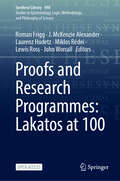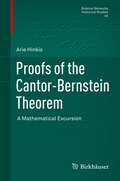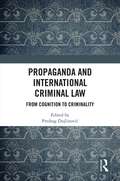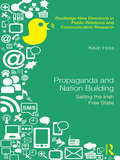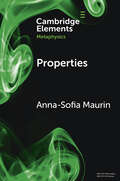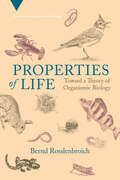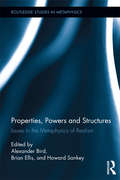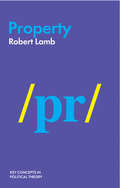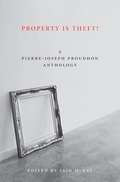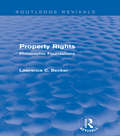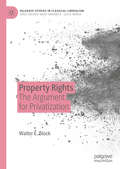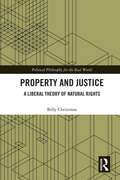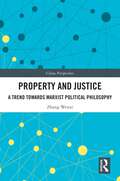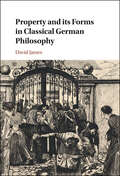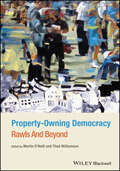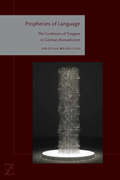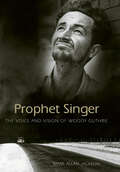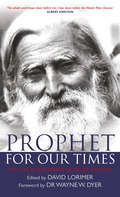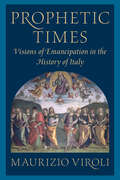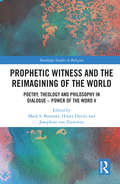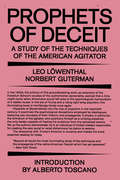- Table View
- List View
Proofs and Refutations
by John Worrall Elie ZaharProofs and Refutations is essential reading for all those interested in the methodology, the philosophy and the history of mathematics. Much of the book takes the form of a discussion between a teacher and his students. They propose various solutions to some mathematical problems and investigate the strengths and weaknesses of these solutions. Their discussion (which mirrors certain real developments in the history of mathematics) raises some philosophical problems and some problems about the nature of mathematical discovery or creativity. Imre Lakatos is concerned throughout to combat the classical picture of mathematical development as a steady accumulation of established truths. He shows that mathematics grows instead through a richer, more dramatic process of the successive improvement of creative hypotheses by attempts to 'prove' them and by criticism of these attempts: the logic of proofs and refutations.
Proofs and Research Programmes: Lakatos at 100 (Synthese Library #498)
by John Worrall Roman Frigg J. McKenzie Alexander Lewis Ross Laurenz Hudetz Miklos RédeiThis open access book offers new insights into issues raised in philosophy of mathematics and in philosophy of science by Imre Lakatos. Lakatos was one of the most significant philosophers of the 20th Century, and his ideas remain important and relevant today. November 2022 saw the centenary of Lakatos&’s birth, and the event was marked by an international conference held at the LSE – where Lakatos made his career after he had emigrated from Hungary to England. This volume consists of a selection of papers presented at the conference along with two additional contributions to debates about Lakatos&’s continuing influence and importance.
Proofs of the Cantor-Bernstein Theorem
by Arie HinkisThis book offers an excursion through the developmental area of research mathematics. It presents some 40 papers, published between the 1870s and the 1970s, on proofs of the Cantor-Bernstein theorem and the related Bernstein division theorem. While the emphasis is placed on providing accurate proofs, similar to the originals, the discussion is broadened to include aspects that pertain to the methodology of the development of mathematics and to the philosophy of mathematics. Works of prominent mathematicians and logicians are reviewed, including Cantor, Dedekind, Schröder, Bernstein, Borel, Zermelo, Poincaré, Russell, Peano, the Königs, Hausdorff, Sierpinski, Tarski, Banach, Brouwer and several others mainly of the Polish and the Dutch schools. In its attempt to present a diachronic narrative of one mathematical topic, the book resembles Lakatos' celebrated book Proofs and Refutations. Indeed, some of the observations made by Lakatos are corroborated herein. The analogy between the two books is clearly anything but superficial, as the present book also offers new theoretical insights into the methodology of the development of mathematics (proof-processing), with implications for the historiography of mathematics.
Propaganda and International Criminal Law: From Cognition to Criminality
by Predrag DojčinovićThis book addresses the conceptual and evidentiary issues relating to the treatment of propaganda in international criminal law. Bringing together an interdisciplinary range of scholars, researchers and legal practitioners from Africa, Australia, Europe and the United States, the book provides an in-depth analysis of the nature, position and role of the concept of propaganda in mass atrocity crimes trials. A sequel to the earlier Propaganda, War Crimes Trials and International Law: From Speakers’ Corner to War Crimes (Routledge, 2011) this book is the first to synthesize the knowledge, procedures and methods of international criminal law with the social cognitive sciences. Including a comprehensive overview of the most relevant case law, jurisprudence and scientific studies, the book also offers a series of practical insights and strategies for both academics and legal professionals. An invaluable resource for those working in the area of international criminal law, this book will also be of interest to academics, practitioners and students with relevant interests in legal theory, politics, linguistics and psychology.
Propaganda and Nation Building: Selling the Irish Free State (Routledge New Directions in PR & Communication Research)
by Kevin HoraThis book examines the origins of Ireland in its first independent incarnation, the Irish Free State (1922-1937). It explores how contemporary public relations and propaganda techniques were used to construct an identity for this new state – a state which after enduring seven years of insurrection and civil war, became one of the most stable democracies in Europe. This stability, the book argues, was constructed not solely through policies enacted by governments, but through the construction of a Gaelic, Catholic and Celtic national identity. By shifting the perspective to how nation building was communicated, it weaves an interdisciplinary narrative that initiates a new understanding of nation building - providing insights of increasing relevance in current world events. Avoiding a simplistic cause and effect history of public relations, the book examines the uses and effects of early public relations from a political and societal perspective and suggests that while governments were only modestly successful in their varied propaganda efforts, cumulatively they facilitated a transition from violence to peace. This will be of interest to researchers and advanced students with an interest in public relations, propaganda studies, nation building and Irish studies.
Properties (Elements in Metaphysics)
by Anna-Sofia MaurinAlthough the subject matter of this Element is properties, do not expect in-depth introductions to the various views on properties 'on the market'. Instead, here that subject matter is treated meta-philosophically. Rather than ask and try to answer a question like do properties exist? this Element asks what reasons one might have for thinking that properties exist (what problem properties, if they exist, are there to solve), what counts as solving that (or those) problems (including what counts as 'a property'), as well as how we ought to proceed when trying to find out if properties exist (by which method this ought to be decided). As it turns out, these questions and their answers are all intricately intertwined. Theory comparison and theory evaluation is in other words (and perhaps not that surprisingly) tricky. Do properties exist? After reading this Element all we can say is therefore this: that depends.
Properties and Propositions: The Metaphysics of Higher-Order Logic
by Robert TruemanThis book articulates and defends Fregean realism, a theory of properties based on Frege's insight that properties are not objects, but rather the satisfaction conditions of predicates. Robert Trueman argues that this approach is the key not only to dissolving a host of longstanding metaphysical puzzles, such as Bradley's Regress and the Problem of Universals, but also to understanding the relationship between states of affairs, propositions, and the truth conditions of sentences. Fregean realism, Trueman suggests, ultimately leads to a version of the identity theory of truth, the theory that true propositions are identical to obtaining states of affairs. In other words, the identity theory collapses the gap between mind and world. This book will be of interest to anyone working in logic, metaphysics, the philosophy of language or the philosophy of mind.
Properties of Life: Toward a Theory of Organismic Biology (Vienna Series in Theoretical Biology)
by Bernd RosslenbroichA coherent and comprehensive theory of life that synthesizes the specific properties of living organisms.Despite continued advances, science has until now struggled to describe the specific properties that define a living being. By synthesizing several aspects of organismic biology and contemporary science, Properties of Life by Bernd Rosslenbroich generates a coherent concept of the singular quality of being alive—a concept that provides a crucial foundation for scientists, farmers, and medical practitioners and helps explain how we all interact with the world around us and within ourselves.Is an organism an aggregate of parts or an integrated system with agency? Is it a passive stimulus-response machine or a being equipped with subjectivity and consciousness? Rosslenbroich argues that the way people in different fields understand life determines their assumptions about organic function and behavior. In medicine, this extends to the human organism, which influences prevention, diagnosis, and treatment. Drawing attention to a long-standing but underappreciated line of thought in organismic biology, Rosslenbroich&’s original idea emphasizes the autonomy of living processes, their network characteristics, and their self-determined organization in time and structure. A timely and revelatory book, Properties of Life formulates an integrated, unified theory that remains flexible enough to accommodate future developments and resilient enough to withstand the challenges of different theoretical and disciplinary backgrounds.
Properties, Powers and Structures: Issues in the Metaphysics of Realism (Routledge Studies in Metaphysics)
by Brian Ellis Alexander Bird Howard SankeyWhile the phrase "metaphysics of science" has been used from time to time, it has only recently begun to denote a specific research area where metaphysics meets philosophy of science—and the sciences themselves. The essays in this volume demonstrate that metaphysics of science is an innovative field of research in its own right. The principle areas covered are: The modal metaphysics of properties: What is the essential nature of natural properties? Are all properties essentially categorical? Are they all essentially dispositions, or are some categorical and others dispositional? Realism in mathematics and its relation to science: What does a naturalistic commitment of scientific realism tell us about our commitments to mathematical entities? Can this question be framed in something other than a Quinean philosophy? Dispositions and their relation to causation: Can we generate an account of causation that takes dispositionality as fundamental? And if we take dispositions as fundamental (and hence not having a categorical causal basis), what is the ontological ground of dispositions? Pandispositionalism: Could all properties be dispositional in nature? Natural kinds: Are there natural kinds, and if so what account of their nature should we give? For example, do they have essences? Here we consider how these issues may be illuminated by considering examples from reals science, in particular biochemistry and neurobiology.
Property (Key Concepts in Political Theory #9)
by Robert LambFew political ideas are as divisive and controversial for some – and yet taken for granted by others – as the ownership of private property. For its defenders, private ownership is a fundamental right that protects individual freedom and ensures wider economic benefits for the community; for its critics, by contrast, property is institutionalised theft, responsible for lamentable levels of inequality and poverty. In this book, Robert Lamb explores philosophical arguments deployed to conceptualise, justify, and criticise private property ownership. He introduces the radical case against property advanced by anarchist and socialist writers, before analysing some of the most important and influential arguments in its favour. Lamb explains and assesses the various defences of property rights advanced by Locke, Hume, Hegel, J. S. Mill, and Nozick. He then shows how theorists such as John Rawls and his followers encourage us to rethink the very nature of ownership in a democratic society. This engaging synthesis of historical and contemporary theories of property will be essential reading for students and scholars of political philosophy.
Property Is Theft!
by Pierre-Joseph Proudhon Iain Mckay"An indispensable source book for anyone interested in Proudhon's ideas and the origins of the socialist and anarchist movements in nineteenth-century Europe."-Robert Graham, editor of Anarchism: A Documentary History of Libertarian Ideas"Iain McKay's introduction offers a sure-footed guide through the misconceptions surrounding Proudhon's thought."-Mark Leier, author of Bakunin: The Creative PassionMore influential than Karl Marx during his lifetime, Pierre-Joseph Proudon's work has long been out of print or unavailable in English. Iain McKay's comprehensive collection is a much-needed and timely historical corrective.Iain McKay is the editor of An Anarchist FAQ.
Property Rights: Philosophic Foundations (Routledge Revivals)
by Lawrence C. BeckerProperty Rights: Philosophic Foundations, first published in 1977, comprehensively examines the general justifications for systems of private property rights, and discusses with great clarity the major arguments as to the rights and responsibilities of property ownership. In particular, the arguments that hold that there are natural rights derived from first occupancy, labour, utility, liberty and virtue are considered, as are the standard anti-property arguments based on disutility, virtue and inequality, and the belief that justice in distribution must take precedence over private ownership. Lawrence Becker goes on to contend that there are four sound lines of argument for private property that, together with what is sound in the anti-property arguments, must be co-ordinated to form the foundations of a new theory. He therefore expounds a concise but sophisticated theory of property that is relevant to the modern world, and concludes by indicating some of the implications of his theory.
Property Rights: The Argument for Privatization (Palgrave Studies in Classical Liberalism)
by Walter E. BlockIn this timely book, Walter E. Block uses classical liberal theory to defend private property rights. Looking at how free enterprise, capitalism and libertarianism are cornerstones of economically prosperous civilizations, Block highlights why private property rights are crucial. Discussing philosophy, libertarian property rights theory, reparations and other property rights issues, this volume is of interest to academics, students, journalists and all those interested in this integral aspect of political economic philosophy.
Property and Justice: A Liberal Theory of Natural Rights (Political Philosophy for the Real World)
by Billy ChristmasThis book gives an account of a full spectrum of property rights and their relationship to individual liberty. It shows that a purely deontological approach to justice can deal with the most complex questions regarding the property system. Moreover, the author considers the economic, ecological, and technological complexities of our real-world property systems. The result is a more conceptually sound account of natural rights and the property system they demand. If we think that liberty should be at the centre of justice, what does that mean for the property system? Economists and lawyers widely agree that a property system must be composed of many different types of property: the kind of private ownership one has over one’s person and immediate possessions, as well as the kinds of common ownership we each have in our local streets, as well as many more. However, theories of property and justice have not given anything approaching an adequate account of the relationship between liberty and any other form of property other than private ownership. It is often thought that a basic commitment to liberty cannot really tell us how to arrange the major complexities of the property system, which diverge from simple private ownership. Property and Justice demonstrates how philosophical rigour coupled with interdisciplinary engagement enables us to think clearly about how to deal with real-world problems. It will be of interest to political philosophers, political theorists, and legal theorists working on property rights and justice.
Property and Justice: A Trend Towards Marxist Political Philosophy (China Perspectives)
by Zhang WenxiThis book attempts to answer the question “what on earth is the Marxist political philosophy?” The author discusses Karl Marx's vision of the good life and the good society, focusing in particular on the interrelationship between property and justice. Strictly speaking, the subject of the present book should not be placed within an a priori conceptual framework, which essentially focuses on academic notions of the good society, good government and justice. However, for the purposes of this book, Marxist political philosophy, namely communism, is already embodied in two aspects. This book argues that it is the noisy and confusing modern political philosophy that obscures the actualisation of human nature unfolded by the Marxist political philosophy before us. The book will be essential reading for students and scholars of philosophy, Marxism, Chinese studies and Chinese Marxist philosophy.
Property and Political Order in Africa
by Catherine BooneIn sub-Saharan Africa, property relationships around land and access to natural resources vary across localities, districts and farming regions. These differences produce patterned variations in relationships between individuals, communities and the state. This book captures these patterns in an analysis of structure and variation in rural land tenure regimes. In most farming areas, state authority is deeply embedded in land regimes, drawing farmers, ethnic insiders and outsiders, lineages, villages and communities into direct and indirect relationships with political authorities at different levels of the state apparatus. The analysis shows how property institutions - institutions that define political authority and hierarchy around land - shape dynamics of great interest to scholars of politics, including the dynamics of land-related competition and conflict, territorial conflict, patron-client relations, electoral cleavage and mobilization, ethnic politics, rural rebellion, and the localization and 'nationalization' of political competition.
Property and its Forms in Classical German Philosophy
by David JamesThe theme of property is directly relevant to some of the most divisive social and political issues today, such as wealth inequality and the question of whether governments should limit it by introducing measures that restrict the right to property. Yet what is property? And when seeking to answer this question, do we tend to identify the concept with just one dominant historical form of property? In this book, David James reconstructs the theories of property developed by four key figures in classical German philosophy - Kant, Fichte, Hegel and Marx. He argues that although their theories of property are different, the concept of social recognition plays a crucial role in all of them, and assesses these philosophers' arguments for the specific forms of property they claim should exist in a society that is genuinely committed to the idea of freedom.
Property-Owning Democracy: Rawls and Beyond
by Martin O'Neill Thad WilliamsonProperty-Owning Democracy: Rawls and Beyond features a collection of original essays that represent the first extended treatment of political philosopher John Rawls' idea of a property-owning democracy. Offers new and essential insights into Rawls's idea of "property-owning democracy" Addresses the proposed political and economic institutions and policies which Rawls's theory would require Considers radical alternatives to existing forms of capitalism Provides a major contribution to debates among progressive policymakers and activists about the programmatic direction progressive politics should take in the near future
Prophecies of Language: The Confusion of Tongues in German Romanticism (Lit Z)
by Kristina MendicinoThe scenes of Babel and Pentecost, the original confusion of tongues and their redemption through translation, haunt German Romanticism and Idealism. This book begins by retracing the ways in which the task of translation, so crucial to Romantic writing, is repeatedly tied to prophecy, not in the sense of telling future events, but in the sense of speaking in the place of another—most often unbeknownst to the speaker herself. In prophetic speech, the confusion of tongues repeats, each time anew, as language takes place unpredictably in more than one voice and more than one tongue at once. Mendicino argues that the relation between translation and prophecy drawn by German Romantic writers fundamentally changes the way we must approach this so-called “Age of Translation.” Whereas major studies of the period have taken as their point of departure the opposition of the familiar and the foreign, Mendicino suggests that Romantic writing provokes the questions: how could one read a language that is not one? And what would such a polyvocal, polyglot language, have to say about philology—both for the Romantics, whose translation projects are most intimately related to their philological preoccupations, and for us? In Prophecies of Language, these questions are pursued through readings of major texts by G.W.F. Hegel, Wilhelm von Humboldt, Friedrich Schlegel, and Friedrich Hölderlin. These readings show how, when one questions the presupposition of works composed by individual authors in one tongue, these texts disclose more than a monoglot reading yields, namely the “plus” of their linguistic plurality. From such a surplus, each chapter goes on to advocate for a philology that, in and through an inclination toward language, takes neither its unity nor its structure for granted but allows itself to be most profoundly affected, addressed—and afflicted—by it.
Prophecy without Contempt: Religious Discourse in the Public Square
by Cathleen KavenyThe culture wars have as much to do with rhetorical style as moral substance. Cathleen Kaveny focuses on a powerful stream of religious discourse in American political speech: the Biblical rhetoric of prophetic indictment. It can be strong medicine against threats to the body politic, she shows, but used injudiciously it does more harm than good.
Prophet Singer: The Voice and Vision of Woody Guthrie (American Made Music Series)
by Mark Allan JacksonProphet Singer: The Voice and Vision of Woody Guthrie examines the cultural and political significance of lyrics by beloved songwriter and activist Woodrow Wilson “Woody” Guthrie. The text traces how Guthrie documented the history of America's poor and disadvantaged through lyrics about topics as diverse as the Dust Bowl and the poll tax. Divided into chapters covering specific historical topics such as race relations and lynchings, famous outlaws, the Great Depression, and unions, the book takes an in-depth look at how Guthrie manipulated his lyrics to explore pressing issues and to bring greater political and economic awareness to the common people. Incorporating the best of both historical and literary perspectives, Mark Allan Jackson references primary sources including interviews, recordings, drawings, and writings. He includes a variety of materials from the Smithsonian Institution, the Library of Congress, and the Woody Guthrie Archives. Many of these have never before been widely available. The result provides new insights into one of America's most intriguing icons. Prophet Singer offers an analysis of the creative impulse behind and ideals expressed in Guthrie's song lyrics. Details from the artist's personal life as well as his interactions with political and artistic movements from the first half of the twentieth century afford readers the opportunity to understand how Guthrie's deepest beliefs influenced and found voice in the lyrics that are now known and loved by millions.
Prophet for Our Times: The Life & Teachings of Peter Deunov
by David LorimerPeter Deunov (Beinsa Dounov), who lived in Bulgaria from 1864 to 1944, was a great and inspired teacher of the Perennial Wisdom - the essential thread of truth running through all the major world religions. He was an extraordinary man who at once embodied great simplicity and tremendous profundity. All those who knew him testified to the fact that he inspired inner excellence in very ordinary people. His teachings are both direct and clear, and will speak to everybody whatever their creed. Essentially they give a prescription for living in harmony with others, with the Earth and with the Divine.Prophet for Our Times is being brought back into print following Dr. Wayne D. Dyer's desire to share the work of the philosopher who greatly influenced him. This selection of teachings makes ideal reading for anyone on the spiritual path. It explains simply and directly how to find love, wisdom, truth, justice, harmony, and balance in life. It also gives advice on techniques of prayer, meditation, and visualization, and valuable information on right diet and exercise to assist inner focus and clarity. Peter Deunov's wise words will speak to everyone, and will have special appeal to those searching for an authentic spiritual tradition of Western origin.
Prophetic Times: Visions of Emancipation in the History of Italy
by Maurizio ViroliThroughout Italy's history, prophetic voices-poets, painters, philosophers-have bolstered the struggle for social and political emancipation. These voices denounced the vices of compatriots and urged them toward redemption. They gave meaning to suffering, helping to prevent moral surrender; they provided support, with pathos and anger, which set into motion the moral imagination, culminating in redemption and freedom. While the fascist regime attempted to enlist Mazzini and the prophets of the Risorgimento in support of its ideology, the most perceptive anti-fascist intellectual and political leaders composed eloquent prophetic pages to sustain the resistance against the totalitarian regime. By the end of the 1960s, no prophet of social emancipation has been able to move the consciences of the Italians. In this Italian story, then, is our story, the world's story, inspiration for social and political emancipation everywhere.
Prophetic Witness and the Reimagining of the World: Poetry, Theology and Philosophy in Dialogue- Power of the Word V (Routledge Studies in Religion)
by Mark S. Burrows Hilary Davies Josephine Von ZitzewitzThis book explores the prophetic characteristics of literature, particularly poetry, that seek to reimagine the world in which it is written. Using theological and philosophical insights it charts the relentless impulse of literature to propose alternative visions, practicable or utopian, and point toward possibilities of renewal and change. Drawing from each of the three main Abrahamic religions, as well as Greek and Latin classics, an international group of scholars utilise a diverse range of analytical and interpretive methods to draw out the prophetic voice in poetry. Looking at the writings of figures like T. S. Elliot, Blake, Wittgenstein and Isaiah, the theme of the prophetic is shown to be of timely importance given the current state of geo-political challenges and uncertainties and offers a much-needed critical discussion of these broad cultural questions. This collection of essays offers readers an insight into the constructive power of literature. As such, it will be of great interest to scholars working in Religion and the Arts, Religious Studies, Theology and Aesthetics.
Prophets of Deceit: A Study of the Techniques of the American Agitator (Paperbounds Ser. #No. Pb-8)
by Norbert Guterman Leo LowenthalHow authoritarian and racist discourse functionsA classic book that analyzes and defines media appeals specific to American pro-fascist and anti-Semite agitators of the 1940s, such as the application of psychosocial manipulation for political ends. The book details psychological deceits that idealogues or authoritarians commonly used. The techniques are grouped under the headings "Discontent", "The Opponent", "The Movement" and "The Leader". The authors demonstrate repetitive patterns commonly utilized, such as turning unfocused social discontent towards a targeted enemy. The agitator positions himself as a unifying presence: he is the ideal, the only leader capable of freeing his audience from the perceived enemy. Yet, as the authors demonstrate, he is a shallow person who creates social or racial disharmony, thereby reinforcing that his leadership is needed. The authors believed fascist tendencies in America were at an early stage in the 1940s, but warned a time might come when Americans could and would be "susceptible to ... [the] psychological manipulation" of a rabble rouser. A book once again relevant in the Trump era, as made clear by Alberto Toscano's new introduction.

